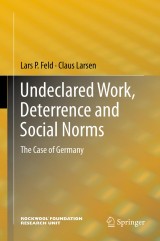Details

Undeclared Work, Deterrence and Social Norms
The Case of Germany|
96,29 € |
|
| Verlag: | Springer |
| Format: | |
| Veröffentl.: | 08.05.2012 |
| ISBN/EAN: | 9783540874010 |
| Sprache: | englisch |
| Anzahl Seiten: | 143 |
Dieses eBook enthält ein Wasserzeichen.
Beschreibungen
<p>For a long time, it has been the declared aim in many countries to fight tax evasion in all its different manifestations, from undeclared work by cleaners and gardeners in private households to tax evasion in the international capital markets. This study focuses on the phenomenon of undeclared work and the case of Germany, presenting the most comprehensive analysis of tax non-compliance for Germany to date, based on surveys conducted by the Rockwool Foundation.</p><p>Theoretically, the analysis starts from the standard model of tax evasion as being influenced by the subjectively perceived extent of deterrence, the perceived marginal tax burden and social norms. Evidence is provided on the impact of deterrence and other factors on tax non-compliance, and several descriptive statistics are presented to better illustrate the natrure of undeclared work with regard to industry, region, education and other socio-economic characteristics.</p>
Preface.- 1 Introduction.- 2 Defining and Measuring Undeclared Work.- 3 The Size of the German Shadow Economy and Tax Morale According to Various Methods and Definitions.- 4 Deterrence in Germany: A Primer.- 5 Design of the Survey.- 6 The Incidence of Undeclared Work.- 7 The Extent of Undeclared Work in Germany 2001 - 2007.- 8 The Impact of Deterrence on Undeclared Work.- 9 The Impact of Tax Policy on Undeclared Work.- 10 The Impact of Social Norms on Undeclared Works.- 11 Conclusions.- 12 Appendix.
<p><b>Lars P. Feld</b> (*1966), Dr. oec., studied Economics at the University of Saarland at Saarbrücken (1987-1993), finished his Ph.D. (1999) and his habilitation (2002) at the University of St. Gallen. Since 2010, he is Full Professor of Economics, in particular Economic Policy at the University of Freiburg i.Br. and Director of the Walter Eucken Institut. Before he was Professor of Economics, in particular Public Finance at the University of Marburg (2002-2006) and Professor of Economics, in particular Public Economics at the University of Heidelberg (2006-2010). He is a member of the German Council of Economic Experts, a member of the Scientific Advisory Board to the German Federal Finance Ministry (Lifetime Appointment), a member of the German Academy of Sciences Leopoldina and member of the Kronberger Kreis.</p><p><b>Claus Larsen</b> (*1962), 2002 Master in Economics (Cand.polit.), University of Copenhagen, with the Rockwool Foundation Research Unit since 1991. Register and survey based empirical research in topics related to immigration (eduction and language proficiency, demography, crime and legislation) and taxes (undeclared work, tax evasion and fringe benefits) in Denmark and Germany. Newsletter articles and contributions to books and studies primarily from the Rockwool Foundation Research Unit, presentation of research results at conferences and seminars and in the Danish media. The research funded by the Rockwool Foundation is mainly focused on socio-economic aspects and current problems faced by modern western society. The aim is to improve the knowledge base and the quality of the public debate and to provide a good foundation for decisions to be taken by politicians (www.rff.dk).</p><p> </p><p><br></p>
<p>For a long time, it has been the declared aim in many countries to fight tax evasion in all its different manifestations, from undeclared work by cleaners and gardeners in private households to tax evasion in the international capital markets. This study focuses on the phenomenon of undeclared work and the case of Germany, presenting the most comprehensive analysis of tax non-compliance for Germany to date, based on surveys conducted by the Rockwool Foundation.</p><p>Theoretically, the analysis starts from the standard model of tax evasion as being influenced by the subjectively perceived extent of deterrence, the perceived marginal tax burden and social norms. Evidence is provided on the impact of deterrence and other factors on tax non-compliance, and several descriptive statistics are presented to better illustrate the natrure of undeclared work with regard to industry, region, education and other socio-economic characteristics.</p>
<p>Comprehensive overview of the structure and size of the undeclared economy in Germany</p><p>Special focus on the relationship between deterrence and social norms on such activities</p><p>Presents results from several series of survey interviews</p><p>Includes supplementary material: sn.pub/extras</p>

















